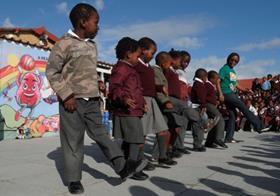
South Africa’s fresh produce sector has initiated a joint programme with authorities in the country’s Western Cape to support better nutrition amongst school children in need in the province.
The programme, which is being led by the Fresh Produce Exporters’ Forum (FPEF) and supported by Dole South Africa, includes a pilot programme involving 10,000 school children in the Western Cape and aims to increase awareness about the importance of fruit in the diet.
“Despite South Africa’s global reputation of being a quality fruit export country, the fruit consumption per capita in the country is only 1.2kg, which is very low compared to the world standards of 6.3kg,’” commented FPEF’s Sandra Betson. “The lack of promotion of fruit and its nutritional value to the majority of our people contributes to the problem.”
A National School Nutrition Programme was first established in 1996 as part of the government’s strategy on poverty alleviation, but it is only since the beginning of May this year that fruit has been included in school menus.
“Currently almost 335,000 learners in the Western Cape are part of the programme at 999 schools across the province,” Ms Betson explains. “Many children have a diet with low nutritional value and some go to school hungry every day, finding it difficult to concentrate on their schoolwork.”
In August 2009, the FPEF initiated a school fruit scheme which is similar to programmes in other parts of the world, initiating a pilot programme in partnership with the Global FoodBanking Network and Peninsula School Feeding Association.
As part of the project, fruit was donated by export organisations and distributed among the schools.
With government adding fruit to the school meals menu, FPEF called upon one of its members to assist; Dole South Africa took up the challenge, launching a programme to encourage children in ‘leading a healthy lifestyle’, with support from the FPEF and the local government.
In addition, Dole South Africa set up a group of Western Cape-based ‘edu-tainers’ to visit schools and provide them with nutritional information.
Accompanied by life-sized fruit characters, the group visited 15 schools in the province and delivered a 20-minute scripted performance, which included dance routines to add flavour and bring the message closer to home.
“The main objective of the programme is to explain the benefits of adopting a balanced diet of fruit and vegetables, clarifying the nutritional functions of these fruits as well as basic hygiene tips,” said Ms Betson.
The musical backing and fruity characters ensure the children remember and understand the messages, she adds.
“The ‘Dole song’ is a huge hit which allows the children to memorise the message and children and teachers are presented with fresh fruit, posters and activity sheets.”






No comments yet